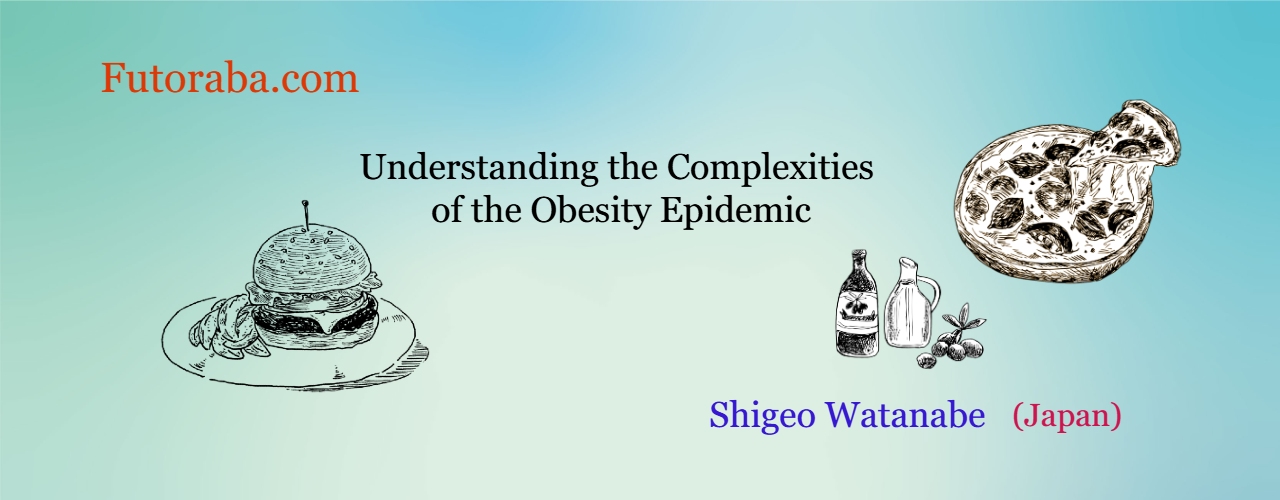Topics
01/04/2019
The Dilution Effect/ Pushing Out Effect of Carbohydrates: Does This Cause People To Gain Weight?
Contents
- If there were no carbohydrates
- Meals high in indigestible foods are not fattening
- The effect of carbohydrates that make it easier to gain weight
(1) Dilution effect
(2) Pushing out effet
<The bottom line>
When we consider that “eating a lot leads to gaining weight,” I believe you have the image of carbohydrates like bread, rice, and noodles in mind.
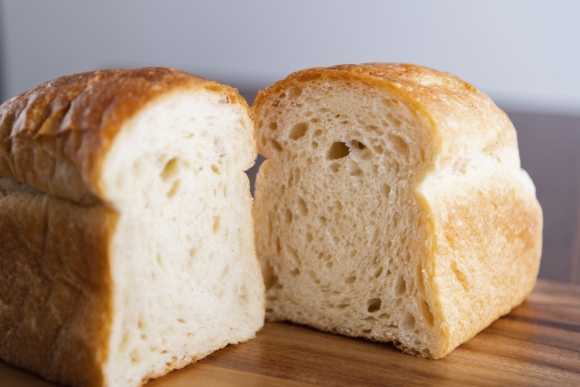
This time, I am going to explain the reason why carbohydrates (*1) make it easier for people to gain weight, not because of an increase in calories or of its tendency to raise blood sugar levels, but by other indirect ways.
(*1) Although technically sugar is also a sort of carbohydrate, I use the word carbohydrate here to mean “polysaccharide” such as starches, bread, and rice.
1. If there were no carbohydrates
When my total body weight fell to under forty kilograms, it would have been impossible to have gained weight without the help of carbohydrates. In my case, neither fat nor sugar could have done that … In other words, I would never have gained weight by eating cream-filled cakes or oily pork cutlets and fatty Chinese food. Next, I am going to explain the reason why.
First, not all carbohydrates are the same. Carbohydrates are mainly categorized by their chemical structure into monosaccharides, disaccharides, oligosaccharides, and polysaccharides.
However, substances like cellulose (a polysaccharide), which is treated as dietary fiber, non-digestible oligosaccharides and resistant starch, should be consumed to improve health.
Additionally, while simple carbohydrates like sugar may lead to temporary weight gain or blood sugar-related disorders, I believe they are not a cause of weight gain in the sense that they increase one’s set-point weight.

In terms of increasing the body's set-point weight, I believe the cause of weight gain is the consumption of easily digestible carbohydrates that are high in starch (polysaccharides) and low in dietary fiber, such as refined grains like rice and wheat, and potatoes.
Therefore, foods like brown rice, wholegrain bread, fried rice, and cold rice, while being the same type of carbohydrate, may produce different results.
These are known as low G.I. foods, which don't raise blood sugar levels easily, or resistant starches. In other words, these foods contain many indigestible components or take longer to digest and absorb.
2. Meals high in indigestible foods are not fattening
When you constantly consume foods that are less digestible or slowly digested and absorbed-such as the above-mentioned carbohydrates that don’t raise the blood sugar level, tough meats, fat, fibrous vegetables, seaweed, and dairy product-intestinal starvation is less likely to occur and you are less likely to gain weight, which means the set-point for body weight is unlikely to go up.
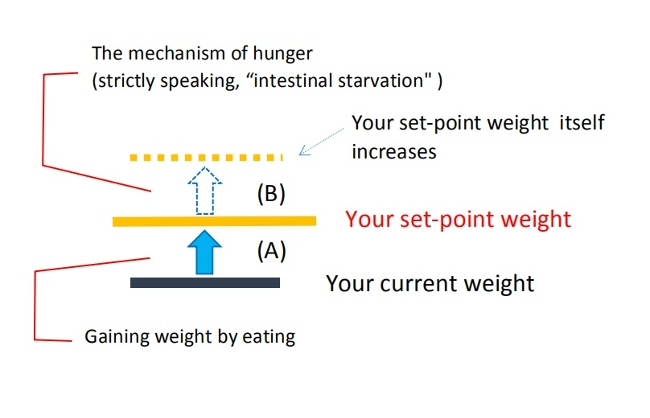
I’m simply saying that it is hard to gain weight if a lean person eats them properly every day.
Although a person who is already overweight may not lose weight by eating some less digestible foods, I consider that it may be possible to lose weight depending on how you eat them, since these foods are always discussed in dieting techniques.
3. The effect of carbohydrates that make it easier for people to gain weight
On the contrary, digestible refined carbohydrates that are high in starch (rice, rice porridge, white bread, potatoes, etc.) and processed starches extracted from plants promote overall digestion. By eating them together with digestible proteins, they make it easier to induce intestinal starvation.
Those are two effects that I can think of so far.
(1) Dilution effect
If you proportionally increase digestible carbohydrates (rice, noodles, bread, etc.) in the meal, the percentage of side dishes such as fat, meat, fish, and vegetables will be relatively smaller. The density of a spoonful of oil will be lower if you eat more bread or rice portions with soup (water).
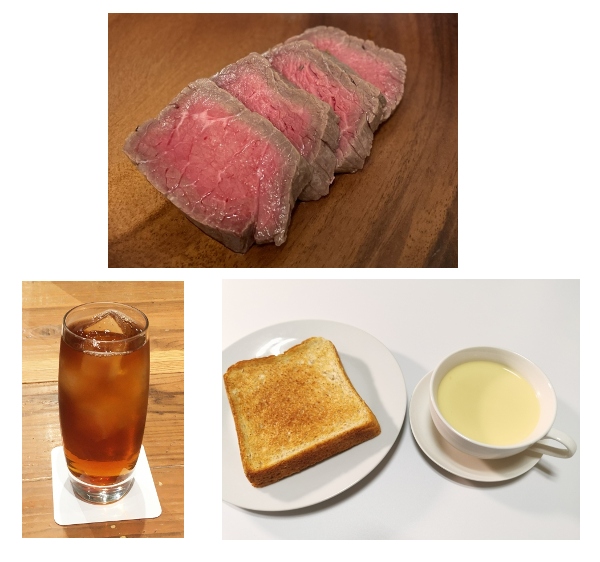
When you eat some meat together with a slice of bread and soup, the density of the meat will be lower.
In other words, easily digestible carbohydrates and water are added and mixed in the stomach, and then the diluted nutrients are sent to the intestines. So, it will be easier to get hungry and induce intestinal starvation.
For example, let’s say you eat a hamburger and a potato, plus another piece of bread and tea. If we mix all of these in a blender, it will be something like meat diluted with starch and water.
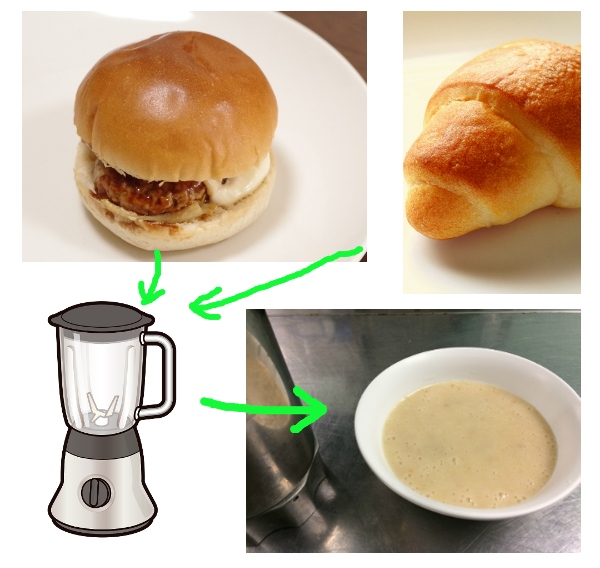
In contrast, if we remove the bread and add mixed beans-mayonnaise salad… the dilution effect of carbohydrates will be less, and fiber and fat will be added.
On a caloric basis, mixed beans-mayonnaise salad is, e.g. 100kcal. However, adding it to the meal doesn’t have the same meaning as adding another piece of bread. This is why calorie intake basis thinking may go wrong.
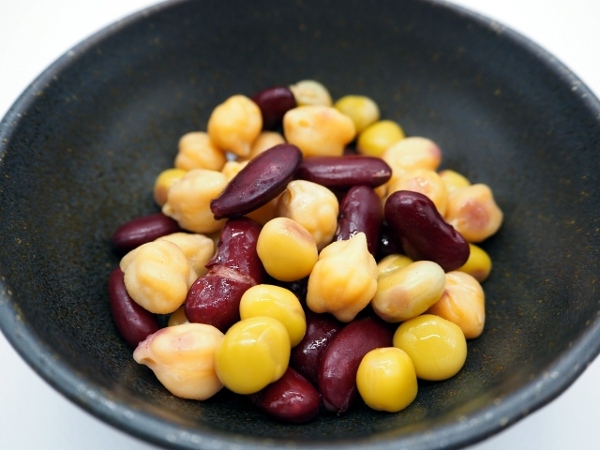
Moreover, as seen in low-carb diets, what would happen if you decrease the intake of carbohydrates in the meal and instead increase proteins such as meat and fish, fat, and vegetables, etc.?
In this case, the opposite effect of the dilution effect occurs: dense nutrients are delivered to the intestines, which slows digestion and undigested food always remains in the gastrointestinal tract.
(2) Pushing out effect

"Balloon effect"
Starch-rich carbohydrates, when consumed with water, cause stomach bloating (I’ll call this the “balloon effect” of the stomach). And, if we eat carbs together with digestible side dishes such as stew (onion, potatoes, low-fat chicken, etc.), its holding time in the gut will be shorter since it’s easy to digest, and the food will be pushed out of the stomach fairly soon. Also, our intestines start to move actively and smoothly.
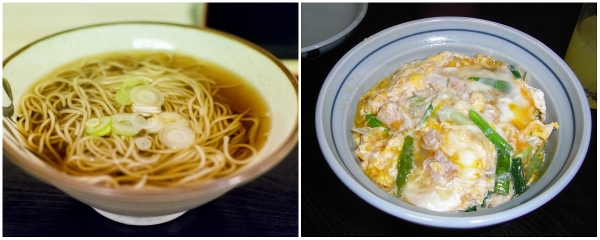
I had the problem with my stomach and intestines and often suffered from constipation or diarrhea.
But, when I ate Japanese soba noodles(*2) and small rice bowl dishes (chicken and egg over rice), it promoted regular bowel movements and relieved my symptoms several times.
(*2) If you don't know much about soba, it may be easier to imagine ramen noodles without oil.
On the other hand, you may think that eating fatty foods or deep-fried foods give us stamina. It actually means that those foods fill us up better than carbs do, and its energy could be sustained during sports such as a marathon or a soccer match.
That is to say, undigested foods stay longer in our stomach and intestines, so it’s more difficult to induce intestinal starvation.
The bottom line
(1) Simply put, incorporating fibrous foods and slow-digesting foods in your diet makes you less likely to gain weight compared to other meals with the same caloric content.
On the other hand, combining easily digestible foods (such as refined carbohydrates, proteins, and ultra-processed foods) in your diet makes you more likely to gain weight.
(2) Carbohydrates are generally classified into monosaccharides, disaccharides, oligosaccharides, and polysaccharides, depending on their chemical structure.
Substances like cellulose (polysaccharides) which are considered dietary fiber, non-digestible oligosaccharides, and resistant starch, would not cause weight gain and should be consumed to promote health.
I also believe that simple carbohydrates like sugar may cause an increace in blood sugar levels and temporary weight gain, but they are not a cause of weight gain in the sense that they increase one’s set-point weight.
(3) In terms of increasing the body's set-point weight, I believe the foods that may cause obesity are easily digestible carbohydrates (polysaccharides) high in starch, such as white rice, white bread, noodles, and potatoes.
These foods expand with water in the stomach (balloon effect) and may have a "dilution effect" or "push-out effect" in the digestive process, which might lead to intestinal starvation.
(4) Obesity among poverty-stricken people worldwide can be understood as the influence of cheap refined carbohydrates and unbalanced diets (lack of vegetables, etc.). Considering them, it may be easier to imagine that they are not gaining weight due to taking too many calories or sugar, but rather from consuming cheap carbohydrates as mentioned above.
[Related article] Wealthy People Get Fat? Poor People Get Fat?
